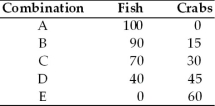Exam 2: The Economic Problem: Scarcity and Choice
Exam 1: The Scope and Method of Economics65 Questions
Exam 2: The Economic Problem: Scarcity and Choice107 Questions
Exam 3: Demand, Supply, and Market Equilibrium86 Questions
Exam 4: Demand and Supply Applications37 Questions
Exam 5: Introduction to Macroeconomics64 Questions
Exam 6: Measuring National Output and National Income84 Questions
Exam 7: Unemployment, Inflation, and Long-Run Growth81 Questions
Exam 8: Aggregate Expenditure and Equilibrium Output58 Questions
Exam 9: The Government and Fiscal Policy71 Questions
Exam 10: The Money Supply and the Federal Reserve System96 Questions
Exam 11: Money Demand and the Equilibrium Interest Rate96 Questions
Exam 12: The Determination of Aggregate Output, the Price Level, and the Interest Rate100 Questions
Exam 13: Policy Effects and Costs Shocks in the Asad Model89 Questions
Exam 14: The Labor Market in the Macroeconomy111 Questions
Exam 15: Financial Crises, Stabilization, and Deficits102 Questions
Exam 16: Household and Firm Behavior in the Macroeconomy: a Further Look92 Questions
Exam 17: Long-Run Growth59 Questions
Exam 18: Alternative Views in Macroeconomics88 Questions
Exam 19: International Trade, Comparative Advantage, and Protectionism63 Questions
Exam 20: Open-Economy Macroeconomics: the Balance of Payments and Exchange Rates105 Questions
Exam 21: Economic Growth in Developing and Transitional Economies48 Questions
Select questions type
Mexico has lower wages than the United States. Does this necessarily mean that it will have a comparative advantage in the production of everything compared to the United States?
(Essay)
4.8/5  (42)
(42)
Critically evaluate the following statement. "If a country can produce a good using fewer inputs than other country then that means that country enjoys a comparative advantage."
(Essay)
4.8/5  (34)
(34)
Papa Ray owns a pizzeria. He is more efficient at making pizza than anyone he could hire. Does this mean that he should make all of the pizzas himself?
(Essay)
4.8/5  (39)
(39)
What are the implications for economic growth for countries specializing in consumer goods rather than capital goods? Assume that they cannot trade what they produce.
(Essay)
4.8/5  (28)
(28)
If a comparative advantage implies that a country can produce a product at a lower opportunity cost than another country then why do we see two countries often trading the same goods? For instance, for most agricultural products the U.S. has a comparative advantage. Japan, one of America's largest trading partners has a comparative advantage in the production of most economy cars. Explain what is going on here when we still see the U.S. exporting cars to Japan and the U.S. importing some foods from Japan.
(Essay)
4.9/5  (34)
(34)
Because of the quantity and quality of its resources, the U.S. has an absolute advantage in the production of many goods and services. Does this imply that the U.S. cannot benefit from trading with a developing country that has less productive ability? Why or why not?
(Essay)
4.9/5  (42)
(42)
Kathy and Amy paint pictures and do caricatures to sell to tourists. In one day, Kathy can either paint two pictures or do four caricatures. In one day, Amy can either paint three pictures or do three caricatures. For both Kathy and Amy, what is the opportunity cost of painting one picture? Who has the comparative advantage in painting pictures and who has the comparative advantage in doing caricatures? How might they be able to increase their total output?
(Essay)
4.8/5  (45)
(45)
Why does the opportunity cost of producing a good rise as more resources are devoted to producing that good?
(Essay)
4.8/5  (40)
(40)
Michael Jordan has more athletic ability than most individuals. Thus, he is more productive at most tasks involving physical skill. Explain why then, it is more efficient for Michael Jordan to pay someone else to mow his lawn.
(Essay)
4.8/5  (29)
(29)
Explain why the costs of most services like haircuts and college education have risen at a faster rate relative to the costs of manufactured goods?
(Essay)
4.8/5  (43)
(43)
Why might an economist argue that it could be damaging to the economic growth of a nation if it focused mostly on the production of consumer goods?
(Essay)
4.8/5  (35)
(35)
Evaluate the following statement. "The nation of Berundi has an absolute disadvantage in the production of everything compared to the United States. Therefore, the United States will have no reason to trade with Berundi".
(Essay)
4.8/5  (29)
(29)
Suppose you have saved $300. You can spend it on a new stereo or on a weekend skiing trip. What is the opportunity cost of going on the skiing trip?
(Essay)
4.8/5  (37)
(37)
Refer to the information provided in Scenario 1 below to answer the following questions.
SCENARIO 1: Consider the following data for the harvest of crabs versus the harvest of fish off the coast of Virginia in answering the following questions.
 -Refer to Scenario 1. If this economy is currently producing 30 crabs and 40 fish how is it possible for it to produce more of both?
-Refer to Scenario 1. If this economy is currently producing 30 crabs and 40 fish how is it possible for it to produce more of both?
(Essay)
4.8/5  (40)
(40)
What is the opportunity cost of producing capital goods such as a new road?
(Essay)
4.9/5  (32)
(32)
How does an individual know whether or not an investment in education is worthwhile?
(Essay)
4.8/5  (39)
(39)
Showing 41 - 60 of 107
Filters
- Essay(0)
- Multiple Choice(0)
- Short Answer(0)
- True False(0)
- Matching(0)